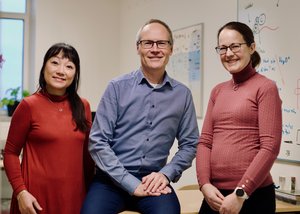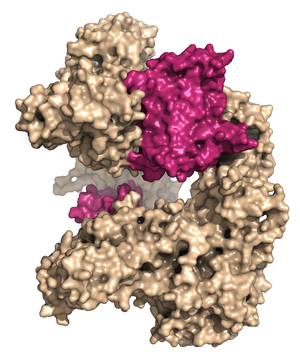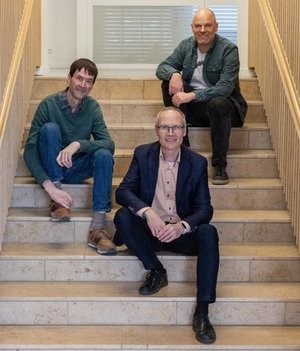
In a major new research project funded by the Carlsberg Foundation's Semper Ardens programme, a research group at the Department of Molecular Biology and Genetics, Aarhus University, who studies bacterial survival and defence mechanisms, will spend the next five years investigating how to turn bacteria's natural immune systems against themselves as a part of future antibiotic treatment strategies. The Carlsberg Foundation has awarded DKK 10 million to Professor Ditlev E. Brodersen for the research project.
![[Translate to English:] figur](/fileadmin/_processed_/8/6/csm_Naturens_noeddeknaekker_knuser_pesticidrester-Figur_973b4af44b.png)
Highly non-degradable chemicals such as PFAS and pesticides can have useful properties in some situations, but are extremely difficult for nature to remove afterwards. Now researchers from Aarhus University have found that certain bacteria use an enzyme that acts as a molecular nutcracker to crush the harmful substances.

A group of teachers at the Department of Molecular Biology and Genetics at Aarhus University has joined forces with former students to develop the teaching of structural biology. The result is a whole new way of teaching computer skills, and it has been well received by new students.

With new insights into how the genetic tool CRISPR – which allows direct editing of our genes – evolved and adapted, we are now one step closer to understanding the basis of the constant struggle for survival that takes place in nature. The results can be used in future biotechnologies.
In a joint collaboration, researchers from Denmark and Switzerland have shown that bacteria produce a specific stress molecule, divide more slowly, and thus save energy when they are exposed to antibiotics. The new knowledge is expected to form the basis for development of a new type of antibiotics.
The hot, muddy pools of Iceland are home to a number of simple, single-celled organisms, and new research shows that they also constitute a true biological battlefield and the basis for an arms race of unprecedented magnitude. The new knowledge about the struggle between living organisms in hot pools gives us a much better understanding of how microorganisms survive when exposed to stress, information which could be used for the development of future drugs.
An international team of researchers has revealed a fundamental mechanism responsible for handling stress in staphylococci when they are exposed to antibiotics. It is expected that the research results eventually can be used to develop new antibiotics that circumvent such stress mechanisms.
Bacteria exhibit extreme adaptability, which makes them capable of surviving in the most inhospitable conditions. New research results produced by Danish and British researchers now reveal the molecular details behind one of the secret weapons used by bacteria in their battle to survive under very nutrient-poor and even toxic conditions.
Ditlev Brodersen's research group at Aarhus University has gained unique insight into how bacteria control the amount of toxin in their cells. The new findings can eventually lead to the development of novel forms of treatment for bacterial infections.
A research team led by Associate Professor Ditlev E. Brodersen, PhD, has revealed the mechanism behind a completely new type of antibiotic, which may have an important impact on the fight against diseases in the future.

Magnus Kjærgaard, Gregers Rom Andersen, and Ditlev Egeskov Brodersen teach biochemistry and structural biology to students at the Department of Molecular Biology and Genetics. Now, they are receiving the Novo Nordisk Foundation Prize for Natural Science Teachers at Universities and DKK 1,500,000 for their dedication and teaching efforts, which will be used, among other things, to develop teaching across the department.
![[Translate to English:] Ditlev Brodersen](/fileadmin/_processed_/1/b/csm_Ditlev_E_Brodersen-professor2_9d5be525e5.jpg)
Ditlev Egeskov Brodersen has been appointed Professor of Structural Microbiology to study microbial survival mechanisms at the Department of Molecular Biology and Genetics at Aarhus University as of 1 June 2021.
As one of the first researchers in the country, Associate Professor Ditlev E. Brodersen receives the Hallas-Møller Ascending Investigator grant as part of the Novo Nordisk Foundation Research Leader Programme. The 10 mio DKK (ca. Euro 1,342,320) grant will provide Ditlev Brodersen's research lab with opportunities to explore the survival mechanisms of microbes for the next five years. The project will be carried out at the Department of Molecular Biology and Genetics.
Associate Professor Ditlev Egeskov Brodersen at the Department of Molecular Biology and Genetics has been awarded a prestigious visiting professorship in structural biology and didactics at the PhD level at Università di Parma, Italy.
On Wednesday 11 June 2014, a novel learning platform is launched at Aarhus University, curriculearn.dk. The platform has been developed by Associate Professor Ditlev Egeskov Brodersen at the Department of Molecular Biology and Genetics (MBG) and will be presented to the public on Thursday afternoon at a workshop at the conference "Frontiers in Science Education" held at the Lakeside Lecture Theatres, Aarhus University (AU).
AU Ideas has awarded a grant of DKK 5 million (approximately EUR 670,000) to Ditlev E. Brodersen to start a pilot centre for research into giant enzymes. The research could form the basis for developing new pharmaceuticals.